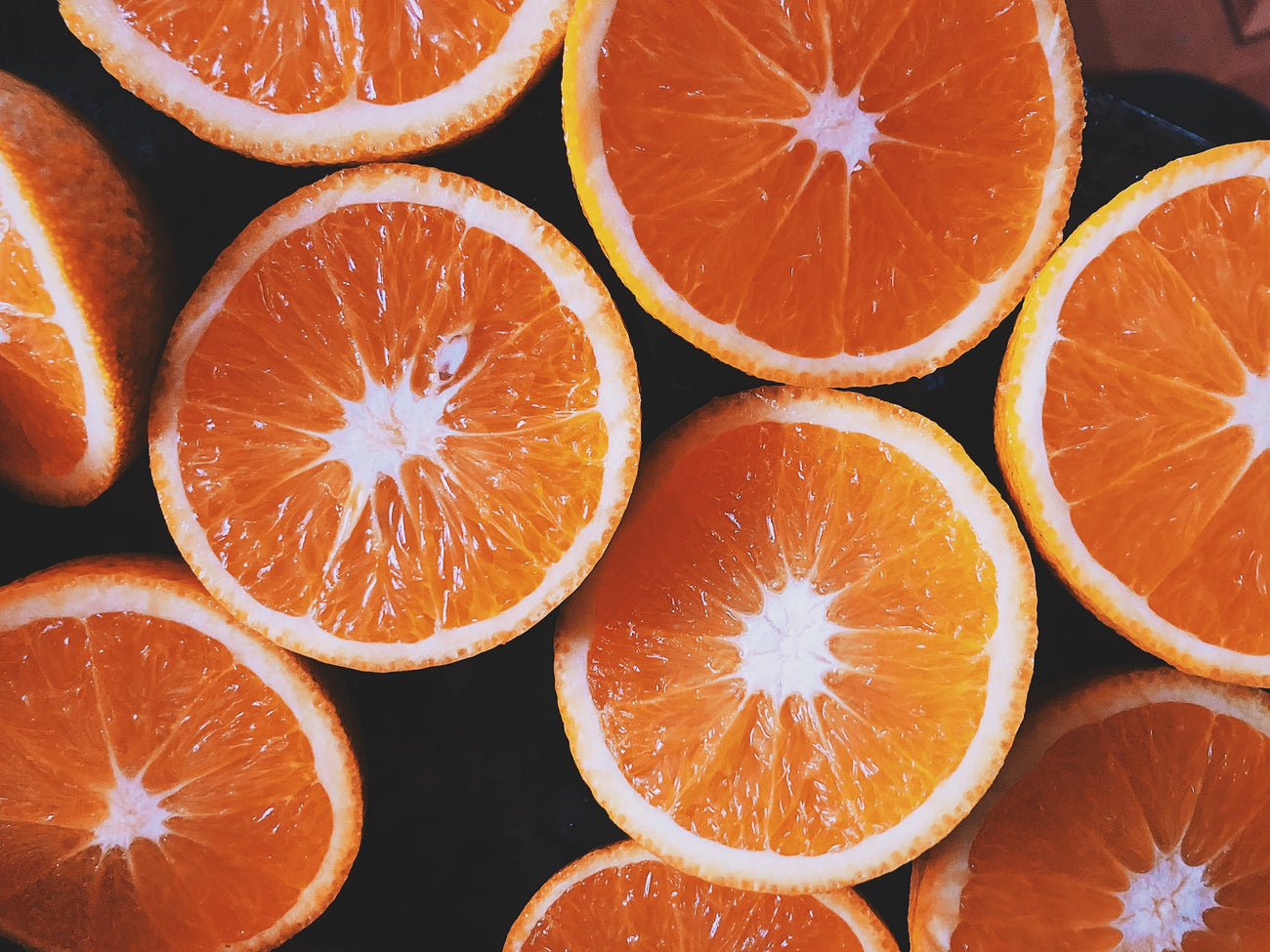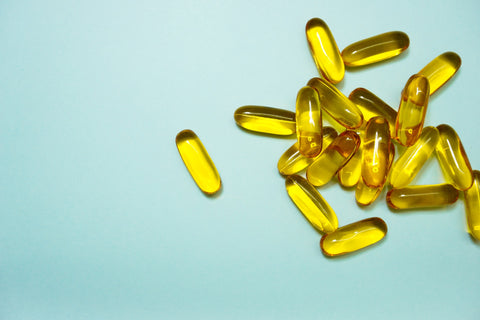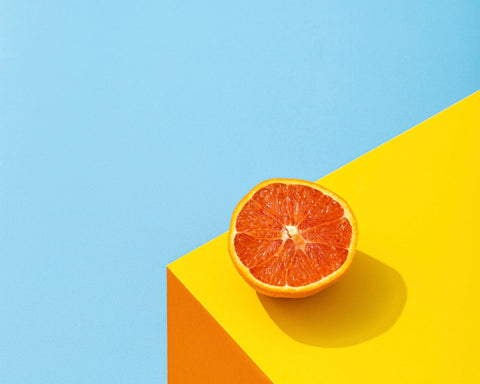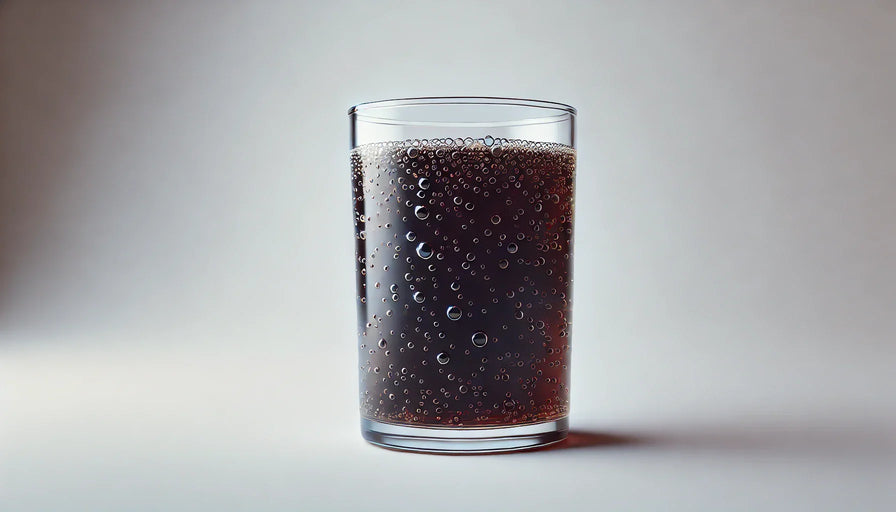
What is Vitamin D and How to Get More of it

What is vitamin D?
Vitamin D is a fat-soluble nutrient that our bodies produce when sunlight hits our skin.Nicknamed the "sunshine vitamin," it plays a pivotal role in keeping our bones healthy by helping our bodies absorb calcium.
Let's chat about Vitamin D, the veritable superhero of nutrients. It's the sunlight vitamin, bringing the heat in keeping your bones sturdy and your mood as bubbly as your favorite seltzer.
Yet, despite its importance, most of us are catching fewer rays than a subterranean mole. And as we become more conscious about wearing sunscreen and spending time indoors, our vitamin D levels can suffer.
Let's learn more about why we need vitamin D , how to get enough of it, and why it's crucial for our overall health and well-being.
Table of contents

Why the body needs vitamin D
- Improves bone health
- Boosts immune system
- Elevates mood
- Promotes heart health
There's more to Vitamin D than sun-kissed skin and healthy bones. This dynamic nutrient plays a starring role in your body's epic daily performance, from supporting your immune system to keeping your mood as sparkling as your favorite homemade seltzer. The benefits of Vitamin D are including, but not limited to:
Improves bone health
Just like the robust bubbles in your sparkling water, Vitamin D is all about strength and resilience. It aids in the absorption of calcium and phosphate, essential minerals for bone formation and density.
Without sufficient Vitamin D, bones can become thin, brittle, or misshapen, leading to conditions like osteoporosis or rickets.
Boosts immune system
Consider Vitamin D as your immune system's personal trainer, always pushing it towards its best performance. It bolsters our body's natural defenses, reducing the risk of illnesses and infections.
Studies suggest that Vitamin D might even play a role in preventing influenza, boosting your immunity while you enjoy your fizzy drink.
Elevates mood
Vitamin D can be your daily dose of sunshine, even on those gloomy days. Research indicates a correlation between low Vitamin D levels and mood disorders, including depression and anxiety.
So, while you’re sipping on your favorite bubbly beverage, let the Vitamin D lift your spirits.
Promotes heart health
Vitamin D keeps your heart pumping strong, much like the steady stream of CO2 in your soda maker. It’s been linked to reducing the risk of heart disease, hypertension, and stroke. Swap out those canned seltzers for homemade, vitamin D-enriched sparkling water and give your heart the care it deserves.
Related Read:What Are Electrolytes and Why Are They so Good for You
How much vitamin D do you need?
The recommended daily intake of Vitamin D varies depending on age. General guidelines suggest that adults up to the age of 70 should aim for 600 IU (International Units) per day, while those over 70 should target 800 IU per day.
However, it's important to note that these values serve as guidelines and individual requirements can differ based on lifestyle, overall health, and geographical location.
Consulting with a healthcare provider is always wise to determine the optimal dosage for you. Moreover, while supplements can be beneficial, nothing compares to the natural Vitamin D obtained from sunlight and a well-balanced diet.
Signs of vitamin D toxicity
While our bodies crave the warmth and vitality of the radiant Vitamin D, it's essential to know that too much of a good thing can tip the scales into the territory of Vitamin D toxicity, also known as hypervitaminosis D. Although it's rare, it's something to be mindful of, especially if you're using supplements.
- Nausea or vomiting
- Loss of appetite
- Frequent urination
- Kidney problems
- Excessive thirst
- Weight loss
- Constipation or diarrhea
- Fatigue or weakness
- Bone pain or muscle weakness
- Irritability, anxiety, or depression
- High blood pressure
- An abnormal heart rhythm
- Confusion or disorientation
Treatment and prevention of vitamin D toxicity
Treatment
In the rare event of Vitamin D toxicity, immediate medical attention is required. The first step usually involves stopping the intake of Vitamin D supplements.
In more severe cases, your healthcare provider may prescribe medications to reduce the amount of Vitamin D in your body, or you may need to consume high volumes of fluids.
A low-calcium diet might also be recommended to reduce the levels of Vitamin D, as this sunshine vitamin is known for helping the body absorb calcium.
Remember, when it comes to Vitamin D, it's about balance - you want enough to reap its many benefits, but not so much that it leads to toxicity.
Prevention
Prevention is always better than cure. To avoid Vitamin D toxicity, stick to the recommended daily intake and do not exceed it without medical advice.
Choosing natural sources of Vitamin D, like sunlight and Vitamin D-rich foods, over supplements can also help prevent overdosing. Regular check-ups and blood tests can help monitor your Vitamin D levels and ensure they're within the recommended range.
And let's not forget, while enjoying that Vitamin D enriched homemade spritzer, moderation is key!
It's all about finding the perfect balance to enjoy the fizzy sunshine in a glass without tipping over into the not-so-sunny side of Vitamin D toxicity.

Common FAQs on vitamin D
How can I easily get more vitamin D?
Getting more Vitamin D is as easy as stepping outside, grabbing a glass of your favorite homemade seltzer, and soaking up the sun. When sunlight hits your skin, your body naturally produces Vitamin D.
So why not take your CO2 canisters and your Refill Box for a walk to your nearest post office for your next exchange? You'll get your daily dose of Vitamin D and refill your fizzy fix all in one outing. If you're more of a night owl, or live in a less sunny locale, not to worry-- many foods are excellent sources of Vitamin D.
Fatty fish like salmon or mackerel, cheese, egg yolks, and vitamin-fortified foods like some dairy products, orange juice, soy milk, and cereals are all great options. You can also add a Vitamin D supplement to your diet.
Just be sure to consult with a healthcare provider before starting any new supplement regimen. But remember, there's nothing like a good dose of natural sunlight and a crisp, refreshing glass of your favorite, bubbly, Vitamin D Sunshine Spritz. (Psstttt! You can make this tasty treat today in 3 easy steps!)
Related Read: How Much Water Should I Drink Per Day?
Are there different kinds of vitamin D?
There are two primary types of Vitamin D: Vitamin D2 (ergocalciferol) and Vitamin D3 (cholecalciferol). Vitamin D2 is synthesized by plants upon exposure to ultraviolet light. It can be found in fortified foods like cereals and bread, and is also available as a dietary supplement.
On the other hand, Vitamin D3 is produced by our skin when exposed to sunlight. It is also present in certain foods such as fatty fish and egg yolks, and is available in supplement form. Both forms are important for our bodies, so it's essential to ensure we're getting enough of both.
Does vitamin D make you happy?
Vitamin D plays a crucial role in regulating mood, including preventing depression and promoting happiness. It achieves this by supporting the production of serotonin, a brain hormone associated with uplifting moods. Low levels of Vitamin D have been linked to mood disorders and depression.
Therefore, ensuring an adequate intake of Vitamin D through sunlight exposure, diet, or supplements is essential for maintaining positive mental health.
How do I know if I have a vitamin D deficiency?
Despite its crucial role in maintaining our health, Vitamin D deficiency is surprisingly common, affecting almost a billion people worldwide.
Lack of sunlight exposure, living in higher altitudes, having darker skin, and aging are all factors that can contribute to lower Vitamin D levels.
Symptoms of deficiency can be subtle but may include fatigue, frequent sickness, bone and back pain, depression, impaired wound healing, and hair loss. If you suspect a deficiency, consult with a healthcare provider. Remember, the sun is the best source of Vitamin D.
So, grab your favorite homemade seltzer and get outside!
Sparkling water with vitamins
Nowadays, it is quite common to come across sparkling water products that have been enriched with vitamins and minerals. These enhanced beverages offer a delightful way to relish the invigorating effervescence of sparkling water while also benefiting from a nutritional boost. Here are a few illustrative examples:
- Vitamin-Infused Sparkling Water: These are enriched with essential vitamins like Vitamin C, Vitamin B-complex, and Vitamin D. They come in a variety of natural fruit flavors and are usually free of sugar and calories.
- Mineral Sparkling Water: Mineral sparkling waters are bottled at the source of mineral springs, and they naturally contain minerals like calcium, magnesium, and potassium. The mineral content can vary depending on the source of the water.
- Electrolyte Sparkling Water: This type of sparkling water is usually enriched with electrolytes such as sodium, potassium, and magnesium. They're a great option for hydration, especially after workouts or during hot weather.
- Alkaline Sparkling Water: Alkaline sparkling water has a higher pH level compared to regular water. It's believed to help in neutralizing acid in the body and often comes fortified with minerals for added health benefits.
Keep in mind that while these upgraded sparkling waters offer additional nutritional advantages, they should not be a substitute for a well-balanced, nutrient-rich diet.
Additionally, it is crucial to examine the label for any presence of added sugars or artificial ingredients. For more information on how to interpret a nutrition label, you can visit this link.
Summary
Embarking on a journey towards better health can be remarkably simple. Just step outside, bask in the sun, and indulge in a refreshing glass of homemade sparkling water.
By doing so, you effortlessly boost your Vitamin D levels. So, let's raise a toast to our well-being with a fizzy, Vitamin D-infused delight.
And remember, when you replace your CO2 canister, you're not only choosing better hydration, but also embracing the numerous benefits of the sunshine vitamin. Cheers to a healthier you!
Recommended reading

How to Give Back During Thanksgiving 2025
Key takeaways Thanksgiving is a time to express gratitude and share with those in need. From volunteering at local shelters to donating food and essentials, there are numerous ways to give back to...

What Does Carbonation Do to Your Body?
What does carbonation do to your body? Carbonation alone typically has minimal effects; however, it can cause bloating and discomfort for some, and it may worsen acid reflux due to carbon dioxide ...

What Are the Health Benefits of Sparkling Water?
Summary Sparkling water isn't just a refreshing drink—it comes with surprising health benefits too. From aiding digestion to improving hydration, discover how sparkling water can be a healthy addi...